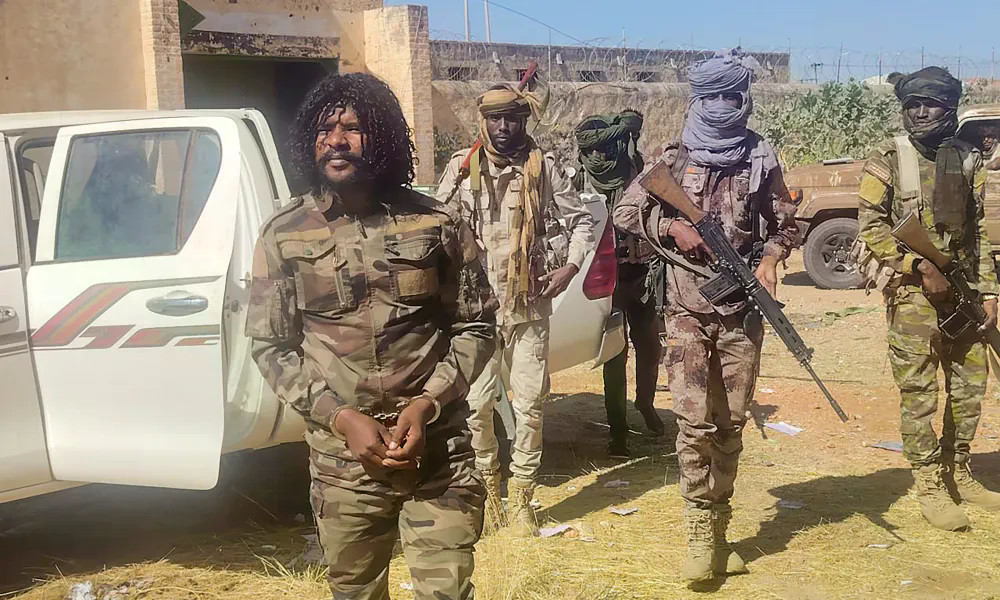
The image of a man with medium-length hair and a bearded face has become widely recognized in Sudan. Known as Abu Lulu, he has appeared in numerous videos, often smiling even as he commits acts of violence against unarmed individuals. The paramilitary Rapid Support Forces (RSF), which he is said to represent, released a photo of him last Thursday showing him in handcuffs after his arrest.
This arrest is part of the RSF’s broader strategy to distance itself from the atrocities committed in the Darfur city of El-Fasher, where its forces took control on October 26 after an 18-month siege. According to the Sudan Doctors Network, at least 1,500 civilians have been killed since the Sudanese Armed Forces (SAF) withdrew from the area, and RSF forces reportedly engaged in widespread violence.
Abu Lulu, also known as Brigadier General Al-Fateh Abdullah Idris, has come to symbolize the deepening cruelty in Sudan since the conflict between the RSF and SAF began in April 2023. Over the past year, he has been linked to multiple killings across the country, with witnesses describing his actions as deliberate performances meant to instill fear, inflame ethnic tensions, and project a grotesque image of power.
In areas such as Al-Jaili, north of Khartoum, footage showed him killing two prisoners of war. In Omdurman’s Al-Salha neighborhood, he is reported to have participated in the killing of 31 civilians. In West Kordofan state’s Al-Khuwair locality, he allegedly executed more than 16 captured soldiers, with witnesses claiming his actions were driven by racial hatred. In El-Fasher, he was filmed confronting an unarmed restaurant owner, asking for his tribe, and shooting him dead after the man identified himself as being from the non-Arab Berti tribe. The victim’s pleas for mercy went unheeded.
On October 27, 2025, new footage circulated online, showing Abu Lulu’s forces killing dozens of civilians in El-Fasher. The massacre, documented and shared on social media, sparked global outrage, with the perpetrator seemingly enjoying the attention.
Dr. David Holmes, a criminal psychologist who reviewed the footage for Al Jazeera, described Abu Lulu as “a narcissistic psychopath,” whose behavior sets him apart from other fighters. He noted that Abu Lulu is particularly proactive in targeting unarmed victims and often uses repeated, random shooting rather than a single bullet to kill. Holmes observed that Abu Lulu appears to enjoy indiscriminate shooting and views himself as a celebrity, posing for the camera as if he believes he is gaining public recognition.
Abu Lulu has frequently broadcast his actions online. In one live TikTok session, he claimed to have killed “2,000 people” and admitted he had “lost count.” The video received both praise and concern from RSF-affiliated users, some calling him a “hero” while others urged him to stop filming.
Following the backlash, several RSF sources stated that Abu Lulu was not officially part of the group but led a “coalition force” allied with it since the war began. A senior RSF military source told Al Jazeera, “He does not belong to the RSF. He leads a group fighting alongside us, but he will be held accountable for his actions. He does not represent the RSF.”
The RSF’s official spokesperson, Al-Fateh Al-Qurashi, later echoed this stance, denying any formal connection to Abu Lulu. RSF leader Mohamed Hamdan Dagalo, known as Hemedti, acknowledged the crimes committed by his troops and announced the formation of an investigation committee, promising accountability.
Despite these statements, skepticism remains. Human rights organizations and analysts note that the RSF has repeatedly used similar tactics to distance itself from field commanders implicated in atrocities, allowing it to maintain its public image while retaining ties to local militias.
The RSF traces its origins to the Janjaweed, a government-backed militia active during the Darfur conflict in the early 2000s. In 2013, then-President Omar al-Bashir restructured the group under the RSF banner, appointing Hemedti as its commander. Though nominally part of the Sudanese military, the RSF evolved into an independent power bloc, accumulating wealth through gold mining and mercenary contracts.
The civil war erupted when the RSF refused to integrate into the SAF according to the latter’s timeline. This conflict allowed the RSF to leverage its urban warfare expertise and extensive networks to seize large parts of Khartoum, Darfur, and Kordofan states. The same tactics that targeted civilians based on ethnicity and perceived loyalties in Darfur resurfaced across the country, leading to thousands of deaths and millions displaced.
Within this context, Abu Lulu has gained notoriety. As footage from the El-Fasher massacre spread globally, calls increased for the United Nations and the International Criminal Court to investigate his alleged crimes for violations of international humanitarian law. Human rights lawyers argue that his documented killings constitute clear evidence of war crimes.
For survivors and families of victims, however, justice feels distant. Khalid, a survivor of the El-Fasher massacre who did not wish to give his full name, said, “He murdered people in front of cameras. He wanted fame.”
The public nature of Abu Lulu’s actions, combined with the widespread availability of footage from the El-Fasher killings, has further eroded the credibility of the RSF, which has attempted to present itself as a respectable force in recent months. In July, the group announced the formation of a parallel government to administer areas under its control, with a presidential council chaired by Hemedti.
However, these efforts have been overshadowed by the El-Fasher killings and the actions of fighters like Abu Lulu. Whether acting independently or under RSF coordination, Abu Lulu has become a symbol of Sudan’s brutal unraveling.
As the war continues, his image—grinning before the camera, rifle in hand—stands as a haunting reminder of the challenges facing the country.


